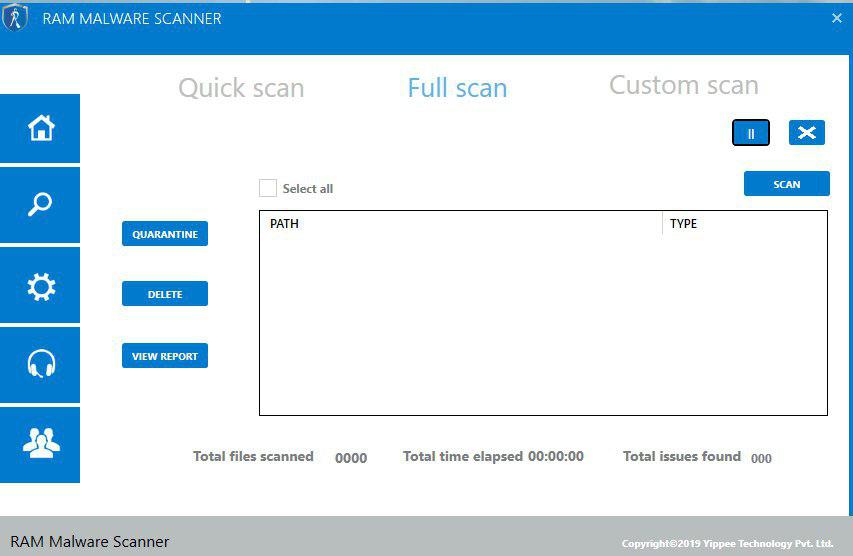Malware Scanner
It’s not just viruses, Trojans or worms that can infect your PC or computer peripherals. There is a host of other malicious software that may seek to use, misuse or negatively impact them. Malware can be spyware or keyloggers intended to steal your financial information from hackers. So when they take over your computer, they join the botnet for activities like email spam or retrieval. Because mine, unfortunately, risks being deleted from all your files unless you make an anonymous payment to unlock ransomware.
Click here to download Free Malware Removal
Malware Scanning – What is it and why is it important
Malware scanning is the process of thorough computer scanning to prevent malware infections. It is accomplished using anti-malware software. This process involves several tools and techniques for identifying malware. To better understand what scan and anti-malware are, let’s see what they are exactly.
Malware analysis process
We mentioned earlier that malware scanning is the process of deep computer analysis that involves several tools and techniques. This process typically includes signature detection, heuristics, sandbox, and removal tools.
How does it work?
Every time a file enters the computer, the malware scanning process starts. The anti-malware scans the file and collects the file code. Note that malware contains a unique code or signature to identify it. The collected code is sent to a database containing the virus signatures. In this process, the code is compared to the codes listed in the database. If it matches one of the virus codes or the signature, the platform returns with a verdict indicating that the file is malicious.
Once identified as a threat, the anti-malware removes it immediately. This technique is called signature-based detection. It uses a virus signature to identify malware. This helps to easily identify malware because the platform contains almost all existing virus codes. However, as thousands of malicious programs are developed every day, updating the platform is hard work. To identify the malware that remains to be discovered, anti-malware developers have created a heuristic.
This approach looks for patterns of behavior to identify malware. Rather than using virus codes to determine if the file is malicious, it identifies malware by its characters and behavior on the computer.
Types of malware scans
You can run a full virus scan of your computer at will, to eliminate any pre-existing malware issues. Most also allow you to schedule a regular scan. But the first line of defense is on-access scanning. For some antivirus utilities, the flick that occurs when Windows Explorer displays the details of a file is enough to trigger a scan. Others wait for the file to be copied to disk or just before executing. The main point is that your antivirus makes sure that no new malware can infest the computer.
Malware protection: How to avoid malware
Computer security should start with powerful and reliable antivirus and anti-malware software. It is a good idea to make it a priority on your home computer and any other device you may have. Installing RAM Antivirus software is one of the best things you can do to prevent malware infections.
Be sure to run periodic diagnostic scans with RAM Antivirus or RAM Malware Removal Tool. You can configure it to have the program run scans automatically at regular intervals. Configure your settings to run a malware detection scan at least once a week, preferably at night when the computer is less likely to be used to avoid interruptions.

What else can you do? It’s a good idea to know your behavior online. Personal education is one of your first lines of defense against malware. For example, always be wary of e-mails from unknown sources, often called phishing e-mails. If your instincts tell you that something seems suspicious or unfamiliar, do not click on links, documents, or embedded photos.
Tip 2: Encrypt and protect your personal information. This is because it is a process that you send using “secret code” and helps protect personal data by scrambling data from your device so no one can read it without the code key.
You can also use a firewall, either on the modem or on each computer, and protect each of your online accounts with a complex and unique password.
Need for Malware Scanner
Malware Scanner is require to remove suspicious worms from websites and PCs. To protect an individual’s personal data from websites from hacking a virus, Malware Scanner is required. As a result, website owners need to scan websites daily to secure data and files and to remove malware from their sites. Every year, malware is multiplying and destroying documents and information. Today, they have multiplied and about 834 million malware has been detect.
These approximate statistics have taken from here and it shows the approx. value until the current year.
To address this problem, website owners need detection and analysis tools to detect all types of malicious programs and validate them through reports.
Here we have discus online malware analysis tools that will enable owners to scan websites for malware, detect malware, and enhance the security of their websites. The main tools for analyzing malware in websites have been discussed in this article. These are the ones that are use by almost every industry in the world.
People May Also Like…
Data protection
What is the data protection Data protection has grown to be of utmost importance to both individuals and organizations in the connected. world of today, where information travels quickly across many digital
What is a security software
Security software It is impossible to overstate the value of strong security software in today's digital world. Individuals and organizations must take proactive measures to safeguard their sensitive data and defend against
Website reputation analysis
Website reputation analysis Websites are incredibly important for establishing an online presence for businesses, organizations, and people in the modern world. Analysis and evaluation of a website's reputation are crucial because there are
What is a Virtual private network (VPN)
What is a virtual private network (VPN) Virtual private network (VPN) have become an essential tool for both individuals and businesses in a time when online privacy and security are of the






